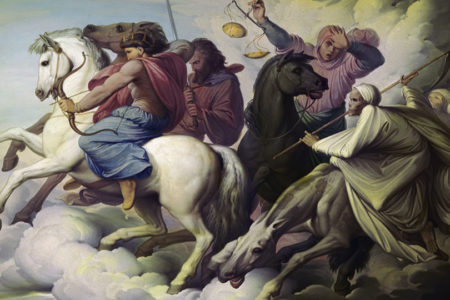Illustrations From the King Matthew 24:32–51
Just as windows let in sunlight, so illustrations illuminate the soul.
Nowhere is this truth more apparent than in Jesus’ illustrative series in Matthew 24:32–51. With delicate yet direct statements, Jesus directed His disciples to God’s divine purposes and disclosed predictive prophetic events that will involve Israel as a nation.
This He did in answer to the disciples’ specific questions: “‘When will these things be? And what will be the sign of Your coming, and of the end of the age?’” (Mt. 24:3).
Like any other passage of Scripture, the Olivet Discourse—Jesus’ answer to these questions—must be interpreted in context. Matthew wrote his Gospel to Jewish people to present divinely attested proof that Jesus (Yeshua) was the legitimate heir to the Davidic throne and that His messianic claims were true and justified.
Furthermore, in this context, Jesus poignantly instructed His disciples (and others, through this passage) to “be ready” and eagerly anticipate His Second Advent.
To stress the utmost urgency of His point, He elaborated with pertinent illustrations:
- The Parable of the Fig Tree (Mt. 24:32–35)
- The Days of Noah (Mt. 24:36–39)
- The Wise/Evil Servant (Mt. 24:45–51)
- The Ten Virgins (Mt. 25:1–13)
- The Parable of the Talents (Mt. 25:14–30)
Since Yeshua spoke primarily to a Jewish audience, His words do not primarily apply to the church. The church began at Pentecost (Acts 2), some weeks later (cf. Eph. 3:5).
It is also important to keep in mind that these parables are still an integral part of the answer to the questions the disciples asked in Matthew 24:3.
The Parable of the Fig Tree
Now learn this parable from the fig tree: When its branch has already become tender and puts forth leaves, you know that summer is near. So you also, when you see all these things, know that it is near—at the doors! Assuredly, I say to you, this generation will by no means pass away till all these things take place. Heaven and earth will pass away, but My words will by no means pass away (Mt. 24:32–35).
The whole point of the Lord’s horticultural exposé about the fig tree and its sprouting leaves was to teach one central, axiomatic truth: A fig tree is a harbinger of summer. In like manner, the signs of Matthew 24:4–28 are a harbinger of His coming, which will occur shortly thereafter. Jesus emphasized the fact that all these precursors would be necessary. All these seemingly disparate phenomena will form a totally integrated whole. Israel must get the big picture and “be ready.” The King is coming. The Kingdom will be established. And Israel’s temporal pain (the Tribulation, the “time of Jacob’s trouble,” Jer. 30:7; cf. Rev. 6—18) will give way to her eternal gain and blessing (Jer. 31:31–34; Rom. 11:25–27).
Therefore, the immediate and wider contexts of Matthew 24:31–35 directly address the nation of Israel.
Jesus continued: “This generation [Greek, genea] will by no means pass away till all these things take place” (Mt. 24:34). Jesus was not referring to the generation of His disciples who listened to Him then. This fact is obvious from Matthew 21:43, where He said, “The kingdom of God will be taken from you and given to a nation bearing the fruits of it.” Historically, the first-century generation would pass away. But the generation of Jewish people living when these signs begin will survive that period and see messiah come as the King of glory. Yeshua’s promise is certain. It is easier for heaven and earth to pass away than for the King’s words to fail (Mt. 24:35; cf. 5:18).
The Days of Noah
But of that day and hour no one knows, not even the angels of heaven, but My Father only. But as the days of Noah were, so also will the coming of the Son of Man be. For as in the days before the flood, they were eating and drinking, marrying and giving in marriage, until the day that Noah entered the ark, and did not know until the flood came and took them all away, so also will the coming of the Son of Man be (Mt. 24:36–39).
Jesus went on to say that in those last days, wickedness will abound as it did in the days of Noah. Even so, He said no one would be able to calculate the precise moment of the King’s return because, at that point, only the Father knew when it would be (v. 36).
Given that Christ stressed that the Jewish people must “be ready,” the Noah illustration is striking. All the people in Noah’s day are said to be going about their normal, daily routines. Preoccupied with temporal issues, they ignored the eternal and lived as if there were no future judgment.
That is the significance of Jesus’ reference to the two men in the field (v. 40) and the two women grinding at the mill (v. 41). Analogous to Noah’s day, the individuals who will be taken are the wicked, whom the King will take away to judgment (cf. Lk. 17:37). Those left will be believers, who will receive God’s grace and mercy. They will populate Messiah’s Kingdom in physical bodies and become the King’s loyal subjects.
The Faithful Servant
Who then is a faithful and wise servant, whom his master made ruler over his household, to give them food in due season? Blessed is that servant whom his master, when he comes, will find so doing. Assuredly, I say to you that he will make him ruler over all his goods. But if that evil servant says in his heart, “My master is delaying his coming,” and begins to beat his fellow servants, and to eat and drink with the drunkards, the master of that servant will come on a day when he is not looking for him and at an hour that he is not aware of, and will cut him in two and appoint him his portion with the hypocrites. There shall be weeping and gnashing of teeth (Mt. 24:45–51).
Jesus began this illustration with the repeated theme, “watch therefore.” His point here is vigilance. The Lord is coming, and His coming will test His servants. The illustration is simple, yet sublime. Just as the master in Jesus’ story entrusted all his possessions to his servant, so the God of Israel has entrusted all things in the earth to His servants. A servant’s response to his Lord reveals the true condition of the servant’s heart (Mt. 24:46, 48–49). The Lord wants to find His servants faithfully doing His will (vv. 45–46). And when the Lord returns, He will reward faithfulness (v. 47).
Failure to do the Lord’s bidding is faithless stewardship. This action brings the Lord’s just punishment because, in the parable, when such a servant noted his master’s delay, he abused his own servants. Yet the master returned to the house unexpectedly, and judgment came (vv. 50–51).
In the Lord’s eyes, that servant was a hypocrite. Thus he was separated from the others and consigned to eternal judgment, where there is “weeping and gnashing of teeth” (cf. mt. 13:42). Likewise, at the Messiah’s Second Advent, the wicked will be judged and separated eternally from God.
These parables of the faithful and evil servants and the talents given them by the master speak of the privileges God has given to His covenant people and the consequences of willful and prolonged disobedience.
So What?
What observations may be taken from Matthew 24:32–51?
Regarding Israel. Matthew’s presentation of Yeshua is consistent, justified, and true. He is Israel’s true King, the “Son of David,” the Messiah of His covenant people. His prophetic predictions in the Olivet Discourse enhance the validity of His Messianic claims and fulfill the promises in the Jewish Scriptures. Furthermore, His Messianic credentials assert His worthiness. Therefore, let all Israel receive Him individually and as a nation.
Regarding the Church. Only in a secondary way can the passage be applied to the church, that is, Jewish and Gentile believers in Yeshua. That said, the church may extrapolate spiritual principles from the passage and appropriate the truth so that believers may be faithful in hearing, believing, and obeying God’s Word.
Specifically, believers should:
- Make every effort to present the Messiah to Jewish and Gentile people in a contextually sensitive, Spirit-endued way. This should involve vigilance in making Him known by life and lip.
- Acknowledge that, whereas Matthew’s Gospel opens with the worship of the newborn King, it was the Gentile magi who came and knelt before Him (Mt. 2:1–12). Matthew closed his account with Yeshua’s poignant command to His disciples, “Go therefore and make disciples of all the nations, baptizing them in the name of the Father and of the Son and of the Holy Spirit, teaching them to observe all things that I have commanded you” (28:19–20).
God’s interests are global—but they start with Israel. Therefore, “pray for the peace of Jerusalem” (Ps. 122:6) and lovingly reach out to His people and to others around the world.
Your life must illustrate the truth. True light illumines the soul.






